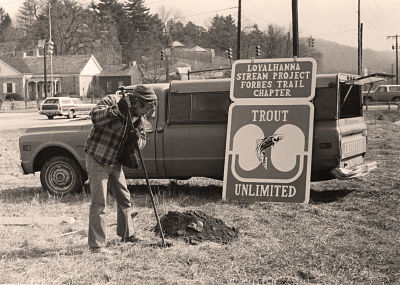
When Europeans arrived in Pennsylvania, “Penn’s Woods,” trees covered 90% of the land and brook trout thrived in its streams. The Allegheny Mountains were America’s western frontier in colonial times. In 1758, from a fort built at the mountain village of Ligonier, now home to Trout Unlimited’s Forbes Trail Chapter, General John Forbes led his army of British regulars, reinforced by Colonials under the command of Colonel George Washington to seize the Forks of the Ohio, 50 miles west at today’s Pittsburgh. To get there they carved a trail along the banks of the Loyalhanna Creek, an Ohio River headwater stream.
This ‘Forbes Trail’ became America’s first highway west and was critical to winning the American Revolution. Soon it brought timber, tanning and mining industries to our mountains, and carried away our natural resources. By 1900, Pennsylvanians had cut down 60% of their trees for America’s western expansion. Forest fires raged and rains washed our fragile soil into our streams. Teddy Roosevelt and Gifford Pinchot, our “Conservation Governor” began restoring Pennsylvania’s forests in 1909 here in the Loyalhanna watershed. It took over 100 years, but today trees again cover 60% of Pennsylvania. While the trees have returned, brook trout, our state fish, are still gone from 90% of our streams.
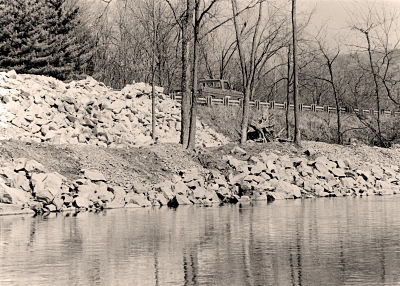
Pittsburgh was once the steel making capital of the world. The once-thriving steel industry burned vast quantities of coal for coke, an ingredient in steel making and for generating electricity to power its mills and furnaces. By opening day 1959, hatchery trout stocked in the Loyalhanna Creek that spring had died. This time the problem wasn’t logging, it was something new called “acid rain.” Western Pennsylvania was receiving the most acidic rain of any place in North America.
Coincidentally, Trout Unlimited was founded that same year on the banks of Michigan’s Au Sable River. Charter member Fred Bear, president of Bear Archery, was from Carlisle, PA. News of TU quickly got back to Carlisle sportswriter and future fly fishing legend Charlie Fox. By 1961 he had formed a TU chapter in Harrisburg, the state capitol. Not to be outdone, Pittsburgh formed its own chapter that same year.
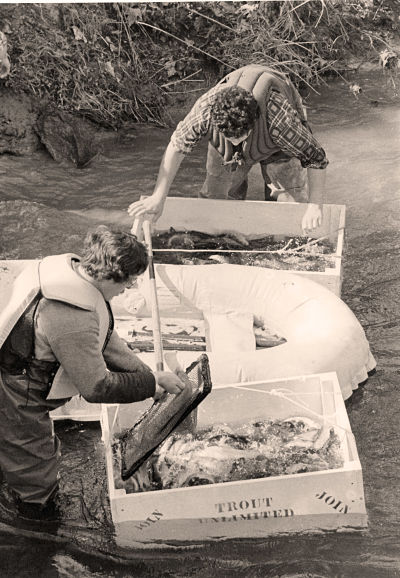
Mother Nature, in an unexpected way, gave Ligonier trout anglers a reason to organize their own chapter. On June 21st, 1972 Hurricane Agnes flooded Western Pennsylvania with nearly 15 inches of rain in a 24 hour period, devastating trout fishing in the Loyalhanna watershed. After the hurricane, money was allocated to remove debris endangering bridges. Charter member Tommy Evans was working on stream bank stabilization when he noticed construction equipment about to begin channelizing the stream. Tommy put them on hold and went into Ligonier to gain assistance from Walt Salig. In a short time, the construction was halted. The land was purchased and given to Loyalhanna Watershed Association, which started the long project to erect trout habitat rather than cut a channel through Ligonier.
Charter members Don Robb, Tommy Evans, Frank Felbaum and Russ Mason were already members of the Pittsburgh chapter. They called a meeting of like-minded anglers at Sleepy Hollow Tavern on the banks of the Loyalhanna Creek in April 1973. Their fishing buddy Ken Sink, in his role as TU State Council President, presided over the organizational meeting and presented Forbes Trail Chapter 206 its charter. Eighteen TU members transferred into the chapter, and with eighteen new members, elected Hunter Wood president, Mike Graboski vice-president, Thomas Patton secretary and Curt Henry treasurer.
By the 1980s Forbes Trail chapter had achieved major success restoring the Loyalhanna Creek as a trout fishery and created a popular Catch-and-Release Delayed Harvest area in Ligonier. This continues to have a direct impact on recreation and tourism, and therefore on our local economy. Forbes Trail Chapter received the prestigious national Golden Trout award for that work.
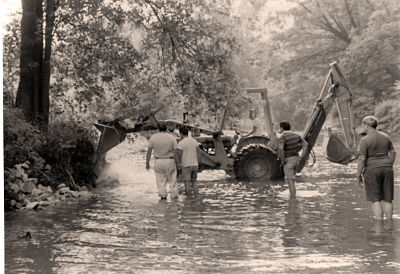
In the 90’s the chapter had assembled a highly capable corps of volunteers and was able to begin restoring the Loyalhanna’s largest year-round cold water tributary. This project required significant fund raising and years of hard physical labor restoring Linn Run back into its original banks in Linn Run State Park, and remediating acid rain and gas well drainage that had destroyed the trout habitat. By spreading hundreds of tons of limestone sand along the headwaters, acidity was reduced and Pennsylvania’s state fish, brook trout, were reintroduced. Forbes Trail Chapter received Pennsylvania Council’s Chapter of the Year Award for that achievement.
During the 2000’s the chapter took on the even greater challenge of restoring trout habitat in the Loyalhanna Creek’s largest tributary by volume, Mill Creek, Ligonier Township. Volunteers successfully accomplished both outdoor scientific studies, and the indoor work of public hearings to secure the grassroots and landowner support publish the first definitive coldwater conservation plan within the Loyalhanna Watershed. The decade-long habitat restoration project included more than 100 stream structures along 5 miles of trout streams, and more importantly justified upgrades of stream classifications that afford additional protections from development and non-point source pollution.
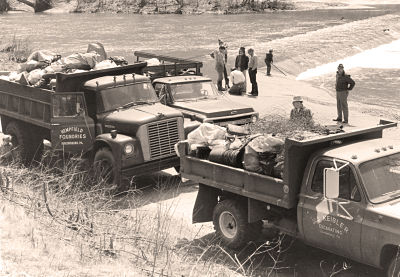
Today our volunteers monitor trout streams to detect potential impacts from Marcellus Shale gas extraction. They assist the local watershed association presenting in-stream science programs. The chapter partners with our YMCA presenting fly fishing programs for women and girls. We work with landowners to create handicapped accessible trout fishing areas. We work with disadvantaged kids on habitat projects, and Boy Scouts earning Fly Fishing Merit Badges.
We continue to focus on the future by introducing the increasingly indoor, Internet generation of young people to trout fishing and coldwater conservation. Our Youth Group gives boys and girls the opportunity to develop fly fishing skills and become conservation minded. Our Trout in the Classroom programs helps local 7th graders learn science and math by raising trout from eggs and releasing them into the wild. It’s a fun and highly motivational program that starts them applying school work to real world problems and thinking about their environment. Forbes Trail’s youth programs have repeatedly been named Pennsylvania TU’s best.
